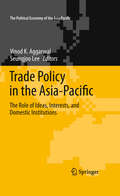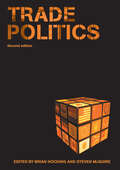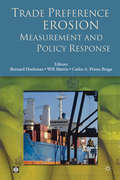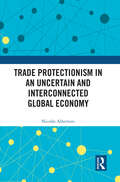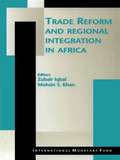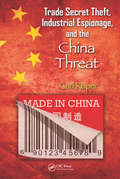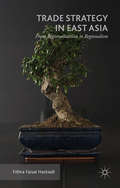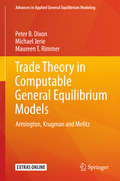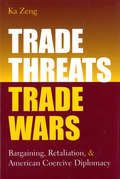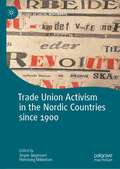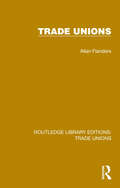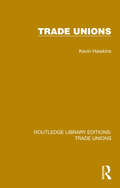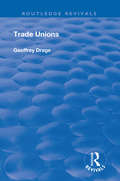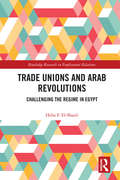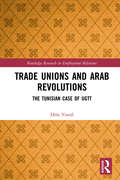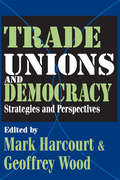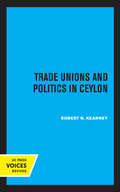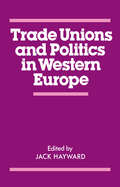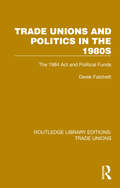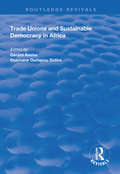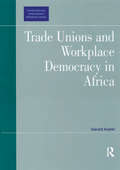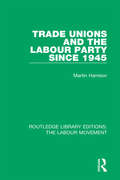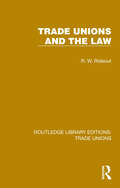- Table View
- List View
Trade Policy in the Asia-Pacific
by Vinod K. Aggarwal Seungjoo LeeEast Asian countries are now pursuing greater formal economic institutionalization, weaving a web of bilateral and minilateral preferential trade agreements. Scholarly analysis of "formal" East Asian regionalism focuses on international political and economic factors such as the end of the Cold War, the Asian financial crisis, or the rising Sino-Japanese rivalry. Yet this work pays inadequate attention to the strategies of individual government agencies, business groups, labor unions, and NGOs across the region. Moreover, most studies also fail to adequately characterize different types of trade arrangements, often lumping together bilateral accords with minilateral ones, and transregional agreements with those within the region. To fully understand this cross-national variance, this book argues that researchers must give greater attention to the domestic politics within East Asian countries and the U.S., involving the interplay of these subnational players. With contributions from leading country and regional trade specialists, this book examines East Asian and American trade strategies through the lens of a domestic bargaining game approach with a focus on the interplay of interests, ideas, and domestic institutions within the context of broader international shifts. With respect to domestic politics, the chapters show how subnational actors engage in lobbying, both of their own governments and through their links to others in the region. They also trace the evolution of interests and ideas over time, helping us to generate a better understanding of historical trends in the region. In addition to scholars of East Asian and comparative regionalism, this book will be of interest to policy-makers concerned with international trade and U.S.-Asia relations, and those interested in understanding the rich trade institutional landscape that we see emerging in the Asia-Pacific.
Trade Politics
by Brian Hocking Steven McGuireTrade has always been an intensely political activity. Its conduct determines the well-being of entire national communities, and expansion of trade since the Second World War has been one of the major engines of world economic growth. In this new, fully updated edition, leading experts from around the world provide a comprehensive overview of the politics of international trade in the twenty-first century. The book explains the changing political environment in which trade policy is shaped, the core political issues, the future trade agenda and the role of the key actors.Subjects covered include:* transatlantic trade relations* regional trading agreements in Asia, Europe, North America and Latin America* how trade affects developing countries* the politics of the World Trade Organization* key policy areas such as agriculture, competition and intellectual property* the role of firms and governments in international trade* how trade impacts on human rights and the environment.
Trade Preference Erosion
by Will Martin Bernard M. Hoekman Carlos Alberto Primo BragaThe multilateral trade system rests on the principle of nondiscrimination. Unilateral trade preferences granted by developed countries can help beneficiary countries but can create tensions between 'preferred' developing countries-typically beneficiaries from pre-existing colonial regimes-and other developing countries. There is also concern about the potential erosion of these preferences through trade liberalization in the importing countries, an issue that has been important in the current negotiations under the Doha Development Agenda of the World Trade Organization. 'Trade Preference Erosion' provides the information needed to make informed assessments of the benefits of trade preferences for developing countries, the risks associated with the erosion of these benefits, and policy options for dealing with these problems. The authors provide detailed analyses of specific preference programs and undertake cross-country, disaggregated analyses of the impact of preferences at the product level. Understanding the likely impacts of these programs and how those impacts are distributed is a precondition for formulating appropriate policy responses. The authors argue that such responses need to go beyond trade policies and need to include a focus on enhancing the competitiveness and supply-side capacity of developing countries. This book is a useful and informative guide for policy makers, non-governmental organizations, and others who wish to better understand the debate on the magnitude and impact of preference erosion.
Trade Protectionism in an Uncertain and Interconnected Global Economy (Routledge Studies In Contemporary Political Economy Ser.)
by Nicolás AlbertoniTrade Protectionism in an Uncertain and Interconnected Global Economy presents the results of almost five years of research on the political economy of trade policy. It argues that in a global context dominated by economic uncertainty and interdependencies, the mechanisms that have fueled the diffusion of trade liberalization under the World Trade Organization (preferential trade agreements and global value chains) can also become channels for protectionism (based on less observable non- tariff or murkier measures). Countries have changed the way they respond to protectionism, which impacts bilateral relations. The author explores why and how increased global trade interconnectivity has also become a channel for new forms of trade protectionism, and especially how this impacts the developing world. These counterintuitive dynamics constitute the newest wave in the literature on trade interdependence. Previous research on trade policy has often concentrated on just one aspect of the effects of an interconnected global economy: the more political and economic linkages countries build among themselves, the fewer tensions they will generate across borders. From a trade policy perspective, this causal claim has held steady for many decades. This book bridges academic analysis with trade policymaking and offers a road map for the kinds of commercial policy reforms that will be essential for the successful revival of world markets after global economic crises as it was the COVID-19 pandemic. This book will appeal to postgraduates, researchers, and academics interested in international political economy, comparative political economy, development, business, and all those with a particular interest in Latin American trade policy dynamics. It will also be of interest to trade policy scholars, practitioners, and readers with an interest in how governments, firms, and regions around the developing world transition into more knowledge-intensive activities.
Trade Reform and Regional Integration in Africa
by Mohsin S. Khan Zubair Iqbal#"Papers presented at the IMF and African Economic Research Consortium seminar on Trade reform and regional integration in Africa, December 1997. "#Includes bibliographical references.
Trade Secret Theft, Industrial Espionage, and the China Threat
by Carl RoperThis book provides an overview of economic espionage as practiced by a range of nations from around the world focusing on the mass scale in which information is being taken for China's growth and development. It supplies an understanding of how the economy of a nation can prosper or suffer, depending on whether that nation is protecting its intellectual property, or whether it is stealing such property for its own use. The text concludes by outlining specific measures that corporations and their employees can practice to protect information and assets, both at home and abroad.
Trade Strategies for a New Era: Ensuring U.S. Leadership in a Global Economy
by Geza Feketekuty Bruce StokesAccording to the authors, challenges resulting from the globalization of production and the integration of former socialist economies into the world market economy create the need for new trade negotiations at both the regional and global level. Government policies and regulations that constitute barriers to foreign trade and investment still need to be overcome. Anti-competitive practices such as trade-restricting cartels need to be eliminated. Philosophical and political differences over how trade agreements should deal with issues such as labor and the environment need to be resolved. The book provides a comprehensive review of the issues confronting U.S. trade policymakers and outlines a strategy to deal with them. The book is essential reading for public officials, business leaders and private citizens who wish to think broadly about American's role in the global economy of the 21st century.
Trade Strategy in East Asia: From Regionalization to Regionalism
by Fithra Faisal HastiadiTrade Strategy in East Asia.
Trade Strategy in East Asia: From Regionalization to Regionalism
by Fithra Faisal HastiadiThe study of regionalism is essential as it has become a vital trend with profound regional and global impacts. Japan, Korea and China are regarded as the key actors for such action in East Asia. While regionalization has created building blocks for economic integration, the act of exclusion from regionalism will only lead to marginalization. Therefore, it is important to learn how to make it work.This book analyzes the effect of China, Japan and Korea's trade strategy on ASEAN countries. As closer economic ties between countries in the area have expanded significantly in the last decade, economic regionalization in East Asia has proceeded in a much more dynamic fashion than regionalist projects. Hastiadi argues that regionalism in the form of Regional Trade Agreements (RTAs) is better than the present regionalization as it promotes sustainability in the future.
Trade Theory in Computable General Equilibrium Models: Armington, Krugman And Melitz (Advances In Applied General Equilibrium Modeling Ser.)
by Peter B. Dixon Michael Jerie Maureen T. RimmerThis book is for people who want to understand modern trade theory, particularly the Melitz model. It lays out Melitz theory from first principles and relates it to earlier theories of Armington and Krugman. For trade theory specialists, the book produces some significant conclusions. It identifies conditions under which Krugman and Melitz models produce essentially the same results for the welfare effects of trade liberalization as those obtained from Armington, and conditions under which this is not true. These findings will be of interest to academics and policy advisors who need to understand critiques of Armington by proponents of Krugman and Melitz.For computable general equilibrium (CGE) modelers, the book shows how Melitz-style CGE models can be calibrated, solved and interpreted. A major practical contribution of the book is to show how large-scale Armington models such as GTAP can be converted to Melitz by the addition of a small number of equations and minimal alteration of the original Armington model.The book describes computational experience in solving Melitz CGE models using GEMPACK software. This experience will be of interest to researchers currently attempting to solve Melitz-based CGE models. Almost all previous Melitz studies have used GAMS software. Authors of these studies have reported computational difficulties. These difficulties did not occur in this book’s GEMPACK-based computations. The book concludes that: (a) CGE modelers can embrace Melitz while retaining their Armington-based models as powerful interpretive devices; and (b) via GEMPACK, large-scale CGE models incorporating Melitz specifications can be solved with no more difficulty than similar-dimensioned Armington models.
Trade Threats, Trade Wars: Bargaining, Retaliation, and American Coercive Diplomacy
by Ka ZengThis study of American trade policy addresses two puzzles associated with the use of aggressive bargaining tactics to open foreign markets. First, as the country with greater power and resources, why has the United States achieved more success in extracting concessions from some of its trading partners than others? Second, why is it that trade disputes between democratic and authoritarian states do not more frequently spark retaliatory actions than those between democratic pairs? Ka Zeng finds answers to both of these questions in the domestic repercussions of the structure of trade between the United States and its trading partners, whether the United States has acompetitivetrade relationship with its trading partner, or whether trade iscomplementary. This book offers practical policy prescriptions that promise to be of interest to trade policymakers and students of international trade policy. Ka Zeng is Assistant Professor of Political Science at the University of Arkansas, Fayetteville.
Trade Union Activism in the Nordic Countries since 1900 (Palgrave Studies in the History of Social Movements)
by Flemming Mikkelsen Jesper JørgensenProviding a Nordic historical perspective, this collection aims to further our understanding of trade union activism and its role in modern society. Contributions from a range of leading scholars analyse the organisational conditions of mobilisation that were deployed by Nordic unionists, and explore the way that they interacted with other forms of social and political protest during the twentieth century. Covering illegal or so-called wildcat strikes, blockades, demonstrations and other activist measures, the authors examine the way that trade union activism in the Nordic countries aimed to move the political combat zone from the meeting rooms of the respective confederations into the streets and the public domain. The collection focuses on cases from Denmark, Sweden, Norway and Finland, but comparisons are also made with countries such as Iceland, Germany, and the USA. Exploring the ways in which political parties have intervened in Nordic trade union activism since the early twentieth century, this unique collection offers new insights for those interested in labour market dynamics and the complex process behind the formation of salary and employment conditions.
Trade Unions (Routledge Library Editions: Trade Unions #7)
by Allan FlandersOriginally published in 1952, Trade Unions quickly became a classic and went through 7 editions. It is a brief yet comprehensive guide to the complex structure and administration of British Trade Unions, which deals concisely and lucidly with every important aspect of the complicated tangle of organisations.
Trade Unions (Routledge Library Editions: Trade Unions #9)
by Kevin HawkinsOriginally published in 1981, Trade Unions was written at a time when there was a widespread belief that Britain’s trade unions were undemocratic, obstructive and strike-prone. This book argues that throughout their history, British trade unions have played a reactive role, and that their objectives, organization and tactics have been shaped by the actions of others, whether employers, governments or the judiciary. The book examines the historical development of the trade union movement and its long running battle with lawyers and judges. It then analyses trade union structure, organization and government and looks at the pattern of union activity in the workplace. Trade Unions will be of interest to students of industrial relations, politics and management studies and for anyone interested in the role of unions within contemporary British society.
Trade Unions (Routledge Revivals)
by Geoffrey DrageFirst published in 1905, this book offers a perspective on the aims and objectives of British trade unions. It details the history, constitution and aims of the trade union, challenging the misconception that a trade union exists solely to foster strikes, harass employers and hamper industry, and discussing the many positives of such organisations. Designed to be accessible for the general public, this book covers history, organisation, function, action and influence.
Trade Unions and Arab Revolutions: Challenging the Regime in Egypt (Routledge Research in Employment Relations)
by Heba F. El-Shazli“We started the 2011 revolution and the rest of Egypt followed,” say Egyptian workers with strong conviction and passion. Egyptian independent workers’ continuous claims of contention and protest repertoires were one of several main factors leading to the January 25, 2011, uprising. After thirty-two years of a Mubarak-led authoritarian regime, massive protests began in January 2011 and forced President Mubarak to step down from his position on February 11, 2011. So, how did Egyptian workers challenge the regime and how did they become one of the factors leading to the January 2011 uprising? These workers were organized into loose networks of different independent groups that had been protesting for a decade and longer prior to January 2011. These regular protests for over a decade before 2011 challenged the Egyptian authoritarian regime. This book examines the combative role of Egyptian independent workers’ formal and informal organizations as a contentious social movement to challenge the regime. It will examine the evolving role of workers as socio-economic actors and then as political actors in very political transitions. Social movement theory (SMT) and its mechanisms and social movement unionism (SMU) will be the lenses through which this research will be presented. The methodology used will be the comparative case studies of two different movements where workers who advocated for their rights for a decade prior to January 2011 experienced significantly differing outcomes. One case study showcases the municipal real estate tax collection workers who were able to establish a successful social movement and then create an independent trade union. The second case study examines an influential group of garment and textile workers, who also developed an effective social movement, yet they were not able to take it to the next step to establish an independent union. I will explore within this research a second question: why one group of workers was able to establish an independent union while the other arguably more influential group of workers, the garment and textile workers, was not able to do so. This had an impact on the overall influence they were able to exercise over the regime in addition to their effectiveness as a social movement for change.
Trade Unions and Arab Revolutions: The Tunisian Case of UGTT (Routledge Research in Employment Relations)
by Hèla YousfiThis book traces the role of the UGTT (the Tunisian General Labour Union) during Tunisia’s 2011 revolution and the transition period that ensued – Tunisia being the Arab country where trade unionism was the strongest and most influential in shaping the outcomes of the uprising. The UGTT; From its role as the cornerstone of the nationalist movement in the colonial era, has always had a key place in Tunisian politics: not so much a labour union but as an organisation that has always linked social struggles to political and national demands. Examining the role played by the UGTT in Tunisia's revolution and more generally in the restructuring of the Tunisian political arena during the three years following the popular uprising. This book asks searching questions such as; how did UGTT interact with the popular uprising that led to the departure of Ben Ali? What was the role played by the UGTT in the "political transition" leading to the adoption on January 26, 2014 of the first democratic constitution in the country’s history? How successful was the UGTT in neutralizing the risk of self- implosion caused by the different political and social crises? And what are the challenges that the UGTT faces in the new political landscape? This volume will be of key reading interest to scholars and researchers of social movements, labour movements, organizational studies, political transitions and Arab revolutions and also likely to be of interest to practitioners especially among activists, unionists and advocates within civil society.
Trade Unions and Democracy: Strategies and Perspectives (G - Reference, Information And Interdisciplinary Subjects Ser.)
by Geoffrey WoodTrade Unions and Democracy explores the role of trade unions as products of, and agents for, democracy. As civil society agents, unions may promote democracy within the wider society, especially in the case of authoritarian regimes or other rigid political systems, by acting as watchdogs and protecting hard-won democratic gains.Established democratic institutions in many advanced societies are facing new challenges. The problem with using trade unions for this purpose is that they remain locked in a cycle of political marginalization and decline. Beyond this, there are, ironically, serious questions about whether unions themselves internally function as democracies. Certainly there are tensions between rank and file membership and an authoritarian leadership, with this infighting having possible effects on strategic deals or alliances and member accountability and actions. On the other hand, trade unions continue to represent a significant component of society within most industrialized countries, and in many case, they have a demonstrated capacity for working with other elements of civil society. Looking forward, trade unions may be able to play a vital role in channeling and focusing spontaneous popular upsurges. In the process, they may revitalize themselves through use of greater internal democracy and become geared toward more diverse constituencies. The question is, will they fulfill this promise or continue to suffer from internal breakups and external breakdowns? Can trade unions save themselves and democracy, or will both deteriorate in time?Trade Unions and Democracy brings together a distinguished panel of leading and emerging scholars in the field and provides a critical assessment of the current role of trade unions in society. It explores their capacity to affect political policies to ensure greater accountability and fairness. It also explores the nature of and extent to which internal representative democracy actually operates within trade unions themselves.Mark Harcourt is a professor in the Department of Strategic Management and Leadership at Waikato University in New Zealand.
Trade Unions and Politics in Ceylon (Center for South and Southeast Asia Studies)
by Robert N. KearneyThis title is part of UC Press's Voices Revived program, which commemorates University of California Press’s mission to seek out and cultivate the brightest minds and give them voice, reach, and impact. Drawing on a backlist dating to 1893, Voices Revived makes high-quality, peer-reviewed scholarship accessible once again using print-on-demand technology. This title was originally published in 1971.
Trade Unions and Politics in Western Europe
by J. E. HaywardThis book analyses the politics and political issues associated with Trade Unions and Trade Unionism in Western Europe.
Trade Unions and Politics in the 1980s: The 1984 Act and Political Funds (Routledge Library Editions: Trade Unions #6)
by Derek FatchettOriginally published in 1987, this book traces the historical and sociological dimensions of the Trade Union movement and analyses the nature of the trade unions’ involvement in the UK Labour Party during the 1970s and 80s. It discusses the review campaigns, and their implications, both for trade unions specifically and for politics in general. From the viewpoint of the trade unions, this book tells of an experience which was, for the Thatcher era, uniquely successful and innervating, opening up new approaches to campaigning.
Trade Unions and Sustainable Democracy in Africa (Routledge Revivals)
by Gerard Kester Ousmane Oumarou SidibeFirst published in 1997, this volume sets out to open a dialogue with the trade union movement and its social partners including civil society, political leaders and the scientific community. The authors, all of whom work closely with APADEP, have drawn on their personal experience and have been guided by a simple, yet flexible, theme: trends in the last few decades in their countries, with the emphasis on transition over the last five years. Part I consists of an overview of sub-Saharan Africa based on selected documentation. Part II is given over to an analysis of the specific situations obtaining in ten African countries in different geographical and language areas. Each case study provides its own democratisation scenario.
Trade Unions and Workplace Democracy in Africa (Contemporary Employment Relations)
by Gérard KesterCan democracy only survive if it is participatory? Is participatory democracy a prerequisite for sustainable development? Are trade unions the most appropriate body through which such aims can be implemented? These critical questions are tackled in Gérard Kester's book, Trade Unions and Workplace Democracy in Africa, which applies an unparalleled depth of research to these issues as they impact African nations, including: Cape Verde, Burkina Faso, Mali, Guinea, Ghana, South Africa, Zambia, Tanzania and Zimbabwe. Rigorously structured, it sets the background of the research and the underlying theory, before presenting the learning experiences within different countries and the the broad implications of the research findings for policy making on democratic participation.
Trade Unions and the Labour Party since 1945 (Routledge Library Editions: The Labour Movement #15)
by Martin HarrisonFirst published in 1960. This title is a study of one of the most controversial alliances in British political history. The ‘wage freeze’, Bevanism, the block vote, nuclear disarmament: these are only a few of the points at which the unions’ activities within the Labour Party had roused hot debate. Drawing extensively on previously unpublished material and on discussions with past members of the Labour Movement, the author creates a survey of what the partnership really amounted to.
Trade Unions and the Law (Routledge Library Editions: Trade Unions #19)
by R. W. RideoutOriginally published in 1973, this book was designed as a concise and usable guide to those aspects of the law which particularly affect trade union members and officials. It deals with the internal and external affairs of trade unions and the law relating to collective bargaining. It also covers deals with dismissal from employment, redundancy and employers’ liability for industrial injuries. The information is presented in a readable form without technical footnotes but with a considerable amount of background information. Diagrams and charts are used where applicable to present or reinforce information.
